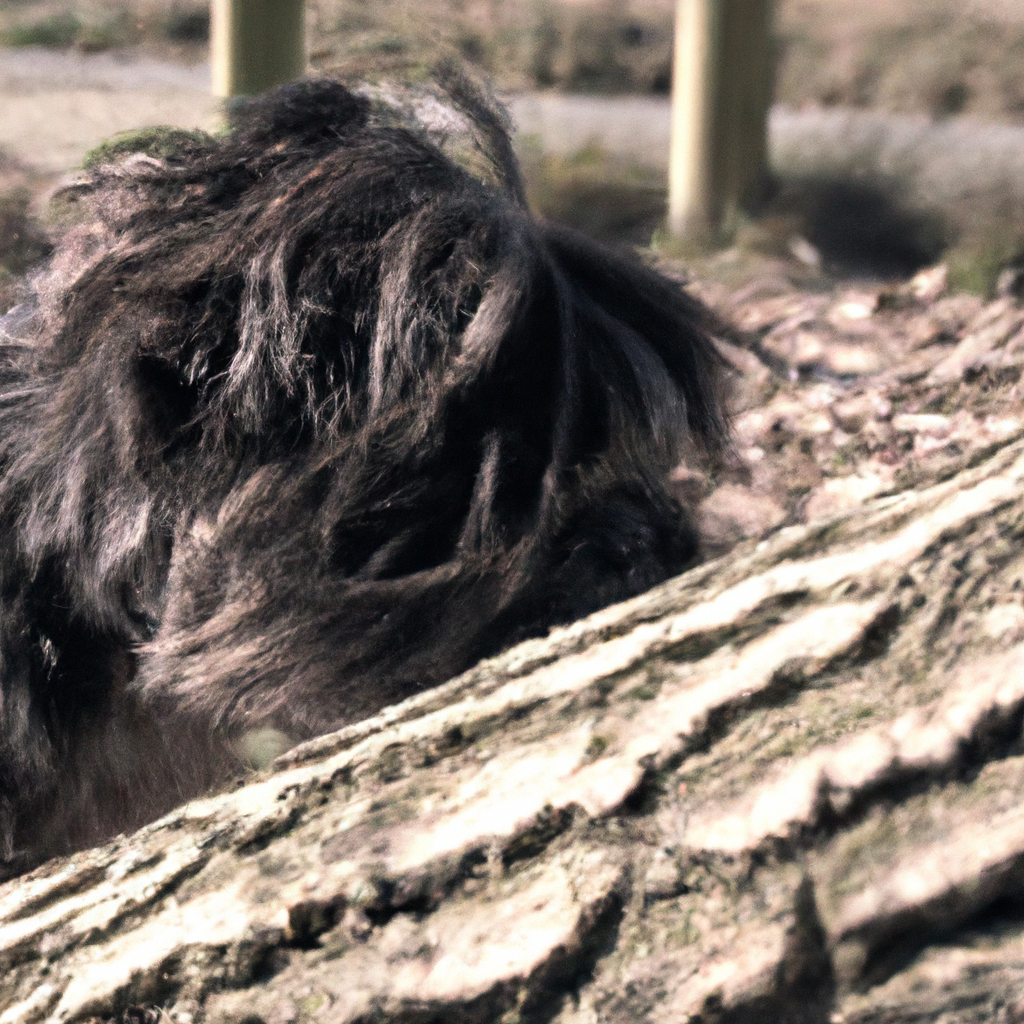Learning about the barking habits of Affenpinschers provides an insight into the behavioral patterns of this small, terrier-like breed. This knowledge is crucial for potential owners and dog enthusiasts to understand their communication methods, triggers for excessive barking, and effective training techniques to manage their vocalization. Affenpinschers, known for their bold and protective nature, often use barking to express various emotions or alert their owners, making their barking habits an integral part of their overall temperament and personality.
Understanding the Barking Habits of Affenpinschers
Affenpinschers, often referred to as “Monkey Dogs” due to their distinct facial features, are small but mighty creatures known for their playful and adventurous spirit. One of the most notable characteristics of this breed is their barking habits. Understanding these habits can be crucial for potential owners, as it can significantly impact the relationship between the dog and its human companions.
Affenpinschers are known for their alertness and protective nature, which often translates into frequent barking. They are quick to sound the alarm at any perceived threat, making them excellent watchdogs. However, this can also lead to excessive barking, especially if they are not properly trained or socialized.
The barking habits of Affenpinschers are often influenced by their environment and the situations they encounter. For instance, they may bark when they are bored, anxious, or seeking attention. They may also bark in response to certain triggers, such as unfamiliar sounds or sights. Therefore, it’s essential to pay attention to what might be causing your Affenpinscher to bark, as understanding the cause can help you address the issue effectively.
Training plays a crucial role in managing the barking habits of Affenpinschers. It’s important to start training them at a young age to ensure they understand when it’s appropriate to bark and when it’s not. Positive reinforcement techniques, such as treats and praises, can be particularly effective in this regard. However, it’s also important to be patient and consistent, as Affenpinschers can be stubborn at times.
Socialization is another key factor in controlling the barking habits of Affenpinschers. Exposing them to a variety of people, places, and experiences can help them become more comfortable in different situations and reduce their tendency to bark at unfamiliar things. Regular exercise can also help, as it can help burn off excess energy and reduce boredom, which can often lead to excessive barking.
While Affenpinschers are known for their barking, it’s important to remember that not all Affenpinschers will bark excessively. Each dog is unique and may have different barking habits. Some may bark more than others, while some may hardly bark at all. Therefore, it’s important to spend time with your Affenpinscher and get to know their individual personality and habits.
It’s also worth noting that while barking can sometimes be a nuisance, it’s a natural behavior for dogs and a primary way for them to communicate. Therefore, it’s important not to punish your Affenpinscher for barking, but rather to teach them when it’s appropriate to bark and when it’s not.
In conclusion, understanding the barking habits of Affenpinschers can be a rewarding experience. It can help you build a stronger bond with your dog and ensure a harmonious living environment. With patience, consistency, and a good understanding of your Affenpinscher’s needs and behaviors, you can effectively manage their barking habits and enjoy the many joys that come with owning this charming and spirited breed.
Decoding the Different Barks of Affenpinschers
Affenpinschers, often referred to as “Monkey Terriers” due to their distinct primate-like appearance, are small but incredibly spirited dogs. Known for their playful and adventurous nature, these dogs are also famous for their unique barking habits. Understanding the different types of barks and what they signify can help you communicate better with your Affenpinscher and cater to their needs more effectively.
Affenpinschers are generally quiet dogs, but when they do bark, it’s usually for a good reason. One of the most common reasons for their barking is to alert their owners of potential threats. Affenpinschers are known for their protective nature, and they won’t hesitate to bark loudly to warn their owners about strangers or unusual noises. This type of bark is typically sharp and persistent, indicating urgency and alertness.
Another common type of bark you might hear from an Affenpinscher is an excited bark. This usually happens when they see their favorite toy, when it’s time for a walk, or when their beloved owners come home after a long day. This bark is often high-pitched and rapid, reflecting their excitement and eagerness. It’s their way of expressing joy and anticipation, and it’s a sound that every Affenpinscher owner becomes familiar with.
Affenpinschers also have a unique bark that they use when they’re feeling anxious or scared. This can happen during thunderstorms, when they’re left alone for too long, or when they encounter something new and unfamiliar. This type of bark is usually low and slow, often accompanied by whining or whimpering. It’s a clear sign that your Affenpinscher is feeling uncomfortable and needs reassurance.
Lastly, Affenpinschers may also bark when they’re bored or seeking attention. If they don’t get enough mental and physical stimulation, they might resort to barking to express their dissatisfaction. This bark is often repetitive and monotonous, a clear sign that your Affenpinscher needs more activity or interaction.
Understanding these different types of barks can greatly improve your relationship with your Affenpinscher. It allows you to respond appropriately to their needs, whether they’re alerting you to a potential threat, expressing their excitement, showing signs of anxiety, or simply asking for more attention. It’s important to remember that while barking can sometimes be seen as a nuisance, it’s one of the main ways that dogs communicate with us. By learning to decode their barks, we can better understand their emotions and needs, leading to a happier and healthier relationship with our furry friends.
However, excessive barking can sometimes be a sign of underlying issues. If your Affenpinscher is barking more than usual, it might be worth consulting with a vet or a professional dog trainer. They can help identify any potential health issues or behavioral problems and provide guidance on how to address them.
In conclusion, the barking habits of Affenpinschers are as unique and varied as the dogs themselves. By understanding what each bark means, you can communicate more effectively with your Affenpinscher and ensure that they’re happy, healthy, and well-cared for. So the next time your Affenpinscher barks, listen closely. They might be trying to tell you something important.
Training Techniques to Control Affenpinscher Barking
Affenpinschers, often referred to as “Monkey Dogs” due to their distinct facial features, are small but mighty dogs known for their playful and adventurous nature. However, like many small breeds, they have a tendency to bark, which can sometimes become a nuisance if not properly managed. Understanding the barking habits of Affenpinschers and employing effective training techniques can help control this behavior, ensuring a harmonious coexistence with these adorable pets.
Affenpinschers are naturally alert and protective, which often triggers their barking. They bark to alert their owners of potential threats, express their excitement, or simply to seek attention. It’s important to remember that barking is a natural behavior for dogs and it’s their way of communicating. However, excessive barking can be a sign of underlying issues such as boredom, anxiety, or fear.
Now, let’s delve into some effective training techniques to control Affenpinscher barking. The first step is to identify the triggers. Once you understand what prompts your Affenpinscher to bark, you can work on addressing those specific situations. For instance, if your dog barks at every passerby, you might need to limit their view of the street or distract them with a toy or treat.
Positive reinforcement is another powerful tool in controlling barking. Reward your Affenpinscher when they stop barking on command or when they remain quiet in a typically triggering situation. This could be a verbal praise, a favorite treat, or a quick play session. The key is to make them associate quiet behavior with positive outcomes.
Another effective technique is teaching your Affenpinscher the ‘quiet’ command. Start by saying ‘quiet’ in a calm but firm voice when your dog starts barking. Once they stop, even for a few seconds, reward them immediately. Over time, they will start associating the command with the action of stopping barking.
However, it’s crucial to remember that patience is key when training an Affenpinscher, or any dog for that matter. Changes won’t happen overnight, and there might be times when your dog regresses. It’s important to stay consistent with your training and not to punish your dog for slip-ups. Punishment can often lead to fear and anxiety, which can exacerbate the barking problem.
In some cases, excessive barking might be due to pent-up energy. Affenpinschers are active dogs and require regular exercise to keep them healthy and happy. Incorporating daily walks, play sessions, or even agility training can help burn off that extra energy and reduce barking.
Lastly, if you’re struggling to control your Affenpinscher’s barking despite your best efforts, it might be worth seeking professional help. A professional dog trainer or a behaviorist can provide personalized training strategies tailored to your dog’s specific needs.
In conclusion, while Affenpinschers are known for their barking, it’s entirely possible to manage this behavior with understanding, patience, and consistent training. Remember, every dog is unique and what works for one might not work for another. The key is to understand your Affenpinscher’s specific triggers and needs, and tailor your approach accordingly. With time and effort, you can enjoy a peaceful and rewarding relationship with your Affenpinscher.
The Role of Environment in Affenpinscher’s Barking Behavior

Affenpinschers, often referred to as “Monkey Terriers” due to their distinct primate-like appearance, are small but incredibly spirited dogs. Known for their playful and adventurous nature, these dogs are also famous for their barking habits. While some may view their barking as a nuisance, it’s essential to understand that barking is a natural behavior for Affenpinschers. It’s their way of communicating, expressing their feelings, and responding to their environment.
The environment plays a significant role in an Affenpinscher’s barking behavior. Just like humans, dogs are products of their surroundings. They react to stimuli in their environment, and their reactions can often be heard through their barks. For instance, an Affenpinscher may bark when it sees a stranger approaching its territory. This is because dogs are naturally territorial and protective of their space. They use their barks to warn off potential intruders and alert their owners of the perceived threat.
Similarly, Affenpinschers may bark when they are bored or anxious. If they are left alone for extended periods or if their environment lacks stimulation, they may resort to barking as a way to express their frustration or seek attention. This is why it’s crucial to provide them with plenty of toys and activities to keep them engaged and mentally stimulated. Regular exercise and playtime can also help reduce excessive barking caused by boredom or anxiety.
On the other hand, Affenpinschers may also bark when they are excited or happy. If they see their favorite toy, a familiar face, or if they are playing a fun game, they may bark out of sheer joy and excitement. This type of barking is usually high-pitched and rapid, reflecting their positive emotions.
However, it’s important to note that not all barking is a result of environmental factors. Sometimes, Affenpinschers may bark due to underlying health issues. Pain, discomfort, or illness can cause a dog to bark excessively. If you notice a sudden change in your Affenpinscher’s barking habits, it’s advisable to consult a vet to rule out any potential health problems.
Understanding the role of environment in an Affenpinscher’s barking behavior can help you manage and even reduce excessive barking. By providing a safe, stimulating, and comfortable environment, you can ensure that your Affenpinscher’s barks are more of joyful expressions rather than signs of distress or boredom.
Remember, barking is a natural part of a dog’s behavior, especially for a breed as spirited and lively as the Affenpinscher. It’s their way of communicating with us and the world around them. So, the next time your Affenpinscher barks, instead of getting frustrated, try to understand what they are trying to communicate. It could be their way of telling you something important about their environment or their feelings.
In conclusion, the environment plays a significant role in shaping an Affenpinscher’s barking habits. By understanding this, you can create a more harmonious living situation for both you and your furry friend. After all, a happy Affenpinscher is a less barky Affenpinscher!
Affenpinschers and Excessive Barking: Causes and Solutions
Affenpinschers, often referred to as “Monkey Terriers” due to their distinct primate-like appearance, are small but mighty dogs known for their playful and adventurous nature. However, like many small breeds, they have a reputation for being somewhat vocal. If you’re considering bringing an Affenpinscher into your home, it’s essential to understand their barking habits, the reasons behind them, and how to manage them effectively.
Affenpinschers are known for their alertness and protective nature, which often translates into a propensity for barking. They are quick to sound the alarm at any perceived threat, making them excellent watchdogs. However, this can also lead to excessive barking, especially if they’re not properly trained or socialized.
One of the primary reasons Affenpinschers bark excessively is due to their high energy levels. These dogs are active and require regular exercise to burn off their energy. If they don’t get enough physical activity, they may resort to barking out of boredom or frustration.
Another common cause of excessive barking in Affenpinschers is anxiety. These dogs are known for their strong attachment to their owners, and they can become anxious or stressed when left alone for extended periods. This can result in what’s known as separation anxiety, a condition that often manifests through excessive barking, among other symptoms.
Now that we’ve identified the common causes of excessive barking in Affenpinschers, let’s explore some solutions. The first step in managing your Affenpinscher’s barking is to ensure they’re getting enough exercise. Regular walks, playtime, and mental stimulation can go a long way in curbing their need to bark.
Training is another crucial aspect of managing your Affenpinscher’s barking habits. Teaching them commands such as “quiet” or “enough” can be incredibly beneficial. However, it’s important to remember that patience and consistency are key when training an Affenpinscher. These dogs are intelligent but can be stubborn, so it may take some time for them to learn and respond to these commands.
If your Affenpinscher’s barking is driven by anxiety, it’s important to address the root cause. This might involve creating a safe and comfortable space for them when you’re not home, or gradually increasing the amount of time they spend alone to help them adjust. In some cases, it may be beneficial to consult with a professional dog trainer or a veterinary behaviorist.
Lastly, positive reinforcement is a powerful tool in managing your Affenpinscher’s barking. Rewarding them for quiet behavior and ignoring them when they bark can help them understand that silence brings rewards, while barking does not.
In conclusion, while Affenpinschers are known for their barking, it’s important to remember that this is a natural part of their behavior as alert and protective dogs. Understanding the reasons behind their barking and implementing effective solutions can help ensure a harmonious relationship with your Affenpinscher. Remember, patience, consistency, and understanding are key in managing your Affenpinscher’s barking habits.
The Impact of Health on Affenpinscher’s Barking Habits
Affenpinschers, often referred to as “Monkey Terriers” due to their distinct primate-like appearance, are small but incredibly spirited dogs. Known for their playful and adventurous nature, these dogs are also famous for their barking habits. However, it’s important to understand that an Affenpinscher’s barking habits can be significantly influenced by their health status.
Affenpinschers are generally healthy dogs, but like any breed, they are prone to certain health conditions. These health conditions can sometimes lead to changes in their barking habits. For instance, if an Affenpinscher is experiencing pain or discomfort due to a health issue, they may bark more frequently as a way of expressing their distress.
One common health issue that can impact an Affenpinscher’s barking habits is dental disease. Dental disease can cause significant discomfort, leading to increased barking. Regular dental check-ups can help identify any potential issues early on, allowing for prompt treatment and potentially reducing excessive barking.
Another health condition that can influence an Affenpinscher’s barking habits is hip dysplasia, a genetic condition that affects the hip joint. This condition can cause pain and discomfort, which may lead to increased barking. Regular vet check-ups and maintaining a healthy weight can help manage this condition and potentially reduce excessive barking.
Hearing loss is another health issue that can impact an Affenpinscher’s barking habits. If an Affenpinscher is experiencing hearing loss, they may bark more frequently due to confusion or frustration. Regular hearing checks can help identify any potential issues early on, allowing for prompt treatment and potentially reducing excessive barking.
It’s also worth noting that an Affenpinscher’s barking habits can be influenced by their mental health. Just like humans, dogs can experience stress and anxiety, which can lead to changes in their behavior, including increased barking. Providing a stable, loving environment and regular exercise can help manage stress and anxiety in Affenpinschers, potentially reducing excessive barking.
In addition to health-related factors, an Affenpinscher’s barking habits can also be influenced by their environment and training. For instance, if an Affenpinscher is not properly socialized, they may bark excessively out of fear or aggression. Regular socialization and positive reinforcement training can help manage this behavior.
In conclusion, while Affenpinschers are known for their spirited nature and barking habits, it’s important to understand that these habits can be significantly influenced by their health status. Regular vet check-ups, a healthy diet, regular exercise, and a stable, loving environment can all contribute to a healthy, happy Affenpinscher with manageable barking habits. So, if you’re considering adding an Affenpinscher to your family, be prepared to invest time and effort into their health and well-being. It’s not just about managing their barking—it’s about ensuring they lead a happy, healthy life.
Affenpinscher’s Barking: Communication or Nuisance?
Affenpinschers, often referred to as “Monkey Terriers” due to their distinct primate-like appearance, are small but mighty dogs known for their playful and adventurous nature. One of the most notable characteristics of this breed is their barking habits. Understanding these habits can help you determine whether your Affenpinscher’s barking is a form of communication or a potential nuisance.
Affenpinschers are known for their alertness and protective nature, which often translates into frequent barking. They are quick to sound the alarm at any perceived threat, making them excellent watchdogs. However, this can also lead to excessive barking, especially if they are not properly trained or socialized. It’s important to remember that barking is a natural behavior for dogs, serving as a primary means of communication. They bark to express a variety of emotions and needs, including excitement, fear, boredom, or the need for attention.
In the case of Affenpinschers, their barking often signifies their desire to protect their territory or their family. They are known to be fearless despite their small size, and they won’t hesitate to confront larger dogs or strangers if they feel threatened. This protective instinct can be a double-edged sword, as it can lead to unnecessary barking at harmless passersby or benign noises.
However, not all Affenpinscher barking is related to their protective nature. Sometimes, these dogs bark out of boredom or loneliness. Affenpinschers are social animals that crave companionship and mental stimulation. If left alone for long periods or not given enough to do, they may resort to barking as a way to express their frustration or get attention.
Understanding the reasons behind your Affenpinscher’s barking is the first step in addressing it. If your dog is barking excessively due to boredom, providing more mental and physical stimulation can help. This could include more walks, playtime, or puzzle toys that challenge them mentally. If your Affenpinscher is barking at perceived threats, training and socialization can help them learn what is and isn’t a threat.
Training an Affenpinscher to control their barking can be a challenge due to their stubborn nature, but it’s not impossible. Positive reinforcement methods, such as treats and praise, can be effective in teaching them to bark only when necessary. It’s also important to be consistent and patient during the training process.
While Affenpinschers are known for their barking, it’s important to remember that every dog is unique. Some Affenpinschers may bark more than others due to individual personality differences or past experiences. It’s also worth noting that while their barking can be loud and frequent, it’s often balanced by their many positive traits, such as their loyalty, playfulness, and affectionate nature.
In conclusion, Affenpinscher’s barking can be both a form of communication and a potential nuisance. Understanding the reasons behind their barking and addressing them appropriately can help ensure a harmonious relationship with your Affenpinscher. Whether they’re sounding the alarm or simply expressing their needs, remember that their barking is just one aspect of their unique and lovable personality.
The Relationship Between Affenpinscher’s Barking and Their Temperament
Affenpinschers, often referred to as “Monkey Terriers” due to their distinct primate-like appearance, are small but mighty dogs known for their playful and adventurous spirit. One of the most notable characteristics of this breed is their barking habits, which are closely tied to their temperament. Understanding the relationship between an Affenpinscher’s barking and their temperament can provide valuable insights into their behavior and help owners better manage their furry companions.
Affenpinschers are known for their bold and confident demeanor. They are fearless, curious, and always ready for an adventure. This spirited temperament often translates into their barking habits. Affenpinschers are not excessive barkers, but they will bark to alert their owners of anything unusual or suspicious. Their sharp senses and protective nature make them excellent watchdogs. However, their barking is not just a sign of alertness; it’s also a way for them to communicate their feelings and needs.
Affenpinschers are very expressive dogs. They use barking as a means to express a range of emotions, from excitement and happiness to anxiety and fear. For instance, an Affenpinscher might bark when they are excited about a walk or playtime. On the other hand, they might also bark when they are anxious or scared, such as during a thunderstorm or when left alone for too long. Therefore, it’s essential for owners to pay attention to the context and triggers of their Affenpinscher’s barking to understand what they are trying to communicate.
Moreover, Affenpinschers are known for their stubborn and independent nature. They like to do things their way and on their own terms. This trait can sometimes lead to persistent barking, especially when they want something or are not getting their way. For example, an Affenpinscher might bark continuously to demand food, toys, or attention. In such cases, it’s crucial for owners to establish clear boundaries and not give in to their demands immediately, as it can reinforce the barking behavior.
However, it’s important to note that while barking is a natural behavior for Affenpinschers, excessive or problematic barking can be a sign of underlying issues. It could indicate boredom, lack of exercise, or even health problems. Therefore, if an Affenpinscher is barking excessively or unusually, it’s advisable for owners to consult a vet or a professional dog trainer.
In conclusion, the barking habits of Affenpinschers are closely tied to their temperament. Their barking serves as a means of communication, expressing their emotions, alerting their owners, and sometimes, asserting their independence. Understanding these barking habits can help owners better understand their Affenpinschers and manage their behavior effectively. However, it’s also important for owners to remember that every Affenpinscher is unique, and their barking habits can vary based on their individual personality and experiences. Therefore, patience, understanding, and a good sense of humor are essential when dealing with the barking habits of these charming and spirited dogs.After learning about the barking habits of Affenpinschers, it can be concluded that these small dogs tend to bark more than some other breeds. They are known for their alertness and protective nature, which often leads to barking when they sense potential danger or unfamiliarity. However, with proper training and socialization, their barking can be managed effectively.





